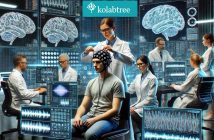The integration of Inteligencia Artificial (IA) into biotech, saludy dispositivo médico (MDC) research has led to groundbreaking innovations. From accelerating drug discovery to improving diagnostic accuracy, AI is reshaping the landscape. However, these advancements come with their own set of challenges, particularly the issue of reproducibility. In this blog, we’ll explore specific use cases from these industries where AI is heavily utilized and how reproducibility becomes a critical concern. We’ll also discuss how freelance experts can provide the necessary support to overcome these challenges.
Use Case 1: AI in Drug Discovery
**Challenge**: One of the most promising applications of AI in biotech is in drug discovery. AI models are used to predict how different compounds interact with biological targets, identify potential drug candidates, and even predict side effects. However, the reproducibility of these AI models can be problematic due to variations in training data, differences in algorithmic approaches, and the sensitivity of models to changes in input parameters.
**Reproducibility Issue**: A biotech company might develop an AI model that predicts the efficacy of a drug compound based on a proprietary dataset. However, when attempting to reproduce these results using a different dataset or by another team within the company, the predictions may vary significantly. This can lead to doubts about the reliability of the AI model, delaying the desarrollo de fármacos process. Research from Springer and Nature highlights the critical role of AI in this field and the associated reproducibility issues, such as the need for consistent data preprocessing and robust validation protocols(Naturaleza, SpringerLink).
**How Freelance Experts Can Help**: A freelance AI specialist can assist in standardizing data preprocessing methods, ensuring that the model is trained consistently across different datasets. They can also document the entire modeling process, including hyperparameter tuning and algorithm selection, making it easier to replicate the model’s performance. Additionally, freelancers can develop robust validation protocols to test the model’s reproducibility in various scenarios, ensuring that the predictions are reliable and consistent.
Use Case 2: AI in Medical Imaging and Diagnostics
**Challenge**: AI is increasingly being used in healthcare to enhance medical imaging and diagnostics. AI models can analyze images from X-rays, MRIs, or CT scans to detect diseases such as cancer, cardiovascular conditions, and neurological disorders. However, reproducibility becomes a critical issue when these AI models are applied across different patient populations, imaging devices, or even clinical settings.
**Reproducibility Issue**: A healthcare provider might deploy an AI model that has been trained to detect tumors in MRI scans. While the model performs well in one clinical setting, it might fail to replicate the same level of accuracy when used in another setting with a different MRI machine or patient demographic. This lack of reproducibility can undermine the trust in AI-driven diagnostics, potentially leading to misdiagnoses. Studies from Nature and MDPI discuss the reproducibility challenges and the importance of harmonizing imaging data and conducting cross-validation to ensure reliable diagnostic performance (Naturaleza, MDPI).
**How Freelance Experts Can Help**: Freelance AI and data scientists can work on harmonizing imaging data from different sources, ensuring that the AI model is exposed to a wide variety of data during training. They can also implement cross-validation techniques that test the model’s performance across different patient populations and imaging devices. By doing so, they can help ensure that the AI model’s diagnostic capabilities are consistent and reliable, regardless of the clinical setting.
Use Case 3: AI in Personalized Medicine
**Challenge**: Personalized medicine is an area where AI has the potential to revolutionize treatment by tailoring therapies to individual patients based on their genetic makeup, lifestyle, and other factors. AI models analyze vast amounts of data to identify the most effective treatment options for each patient. However, the reproducibility of these models is often challenged by the complexity and variability of patient data.
**Reproducibility Issue**: A healthcare provider might use an AI model to recommend personalized treatment plans for cancer patients based on genomic data. However, when the model is applied to a new cohort of patients or in a different clinical environment, the treatment recommendations might differ significantly. This can lead to inconsistent treatment outcomes, reducing the model’s clinical utility. Research indicates the need for standardized data collection and robust validation to maintain reproducibility across different clinical settings (Naturaleza, SpringerLink).
**How Freelance Experts Can Help**: Freelance bioinformaticians y Expertos en IA can contribute by standardizing data collection and preprocessing methods across different patient cohorts. They can also develop robust pipelines that ensure the AI model accounts for variations in patient data. Additionally, they can conduct extensive validation studies to ensure that the model’s treatment recommendations are reproducible and reliable across different clinical environments.
Use Case 4: AI in Medical Device Development
**Challenge**: In the medical device industry, AI is used to optimize device design, improve functionality, and predict device performance in real-world scenarios. However, reproducibility becomes an issue when these AI models are tested across different manufacturing processes, usage conditions, or patient groups.
**Reproducibility Issue**: A medical device company might develop an AI model to optimize the design of a new implantable device. While the model might perform well during the initial design phase, it may fail to reproduce the same results when tested with different manufacturing processes or patient demographics. This inconsistency can delay product approval and market entry. The MDPI study on FDA-approved AI/ML-enabled medical devices emphasizes the importance of ensuring consistent inputs and rigorous testing to validate AI models under various conditions (MDPI).
**How Freelance Experts Can Help**: Freelance engineers y Expertos en IA can assist in standardizing the inputs used in the AI model, ensuring that the design optimization process is consistent across different manufacturing scenarios. They can also conduct rigorous testing to validate the model’s performance under various conditions, helping to ensure that the device design is robust and reproducible. This can accelerate the approval process and bring the device to market faster.
Conclusion: Partnering with Freelance Experts for Reproducibility in AI-Driven Research
The potential of AI in biotech, healthcare, and medical device industries is immense, but it can only be fully realized if the research is reproducible. The complexity of AI models, combined with the variability of data and environments, makes reproducibility a significant challenge. By leveraging the expertise of freelance professionals, companies can ensure that their AI-driven research is not only innovative but also reliable and reproducible.
At Kolabtree, we connect you with a global network of freelance experts in AI, ciencia de los datos, bioinformatics, and more. Whether you’re looking to improve the reproducibility of your drug discovery models, enhance the reliability of your diagnostic tools, or ensure consistency in your medical device designs, our experts can provide the support you need to succeed.
Don’t let reproducibility challenges hold back your AI-driven innovations—partner with Kolabtree and ensure your research is built on a solid foundation of reproducibility.







